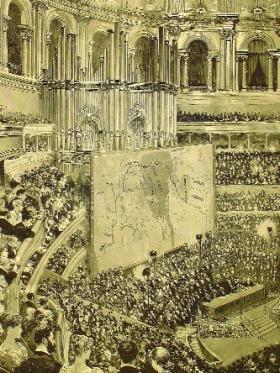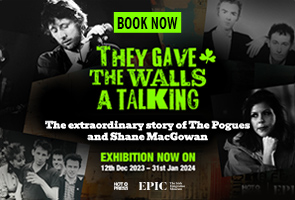‘What Africa is …’, not ‘what Africa needs is…’
Published in 20th-century / Contemporary History, Issue 4 (Jul/Aug 2006), News, Volume 14
African studies, nineteenth-century style—‘Mr Stanley at the Albert Hall. The explorer lecturing before the Royal Geographical Society’. (The Graphic, 10 May 1890)
Yet African history is anything but that in Ireland. It is not taught in most of our universities, and where it is it is reliant on the initiative and goodwill of individual teachers who are prepared to undertake giving a course out of personal interest rather than institutional commitment. The only chair of African history on this island was held, until his untimely death last year, by the much-missed Martin Lynn of Queen’s University, Belfast. It is the oldest lectureship in these islands in African history, established in 1937, and the understanding is that it will not be continued. At a time when both governments, in the UK and in the Republic, are committed to increasing significantly the resources available for tackling the problems of Africa, one of the principal intellectual resources needed for understanding them is being removed.
To take a concrete example: the broadsheet press in Ireland regularly carries letters explaining the need for ‘good governance’ in Africa. On the face of it, this is incontrovertible: one is hardly going to call for bad governance. But ‘good governance’ in this context probably means Western-style, rational, bureaucratic, disinterested government, grounded in scientific principles, providing impartial service to accountable politicians—the very model of modern liberal government. The implication, historically, is that sub-Saharan African states deviated from the bargain-basement model of nation statehood provided at independence and must now re-chart to course. Africa must revert to the role of playing catch-up with the West. A reading of African history might suggest very different conclusions: that Africa has its own historicity, its own particular trajectory, and that attempts to straitjacket it into Western ideas of modernity are inevitably doomed to failure.
A properly historically informed debate about Africa in Ireland might locate the argument not in the fanciful wish-fulfilling rhetoric of ‘what Africa needs is . . .’ but rather in the historically grounded analysis of ‘what Africa is . . .’. This would clear the decks of many of the redundant pieties that clutter so much African representation in Ireland, while anchoring the ahistorical disciplines of economics and sociology in the terra firma of historical analysis.
Yet Africa is still widely held to have no history, an impression emanating from two very different sources, one acting out of blind bigotry, the other out of blind concern. Representative of the first is Hugh Trevor Roper, the man who validated the Hitler Diaries, who remarked that African history amounted to nothing more than an account of the gyrations of Pygmies. Put less pejoratively, it is the view that Africa had an unchanging past, lived under conditions of minimal contact with the outside world. It is a view that still finds voice. Historical research has falsified this view at every level, and the extent of African extroversion is now realised, if not fully accounted for.
The other source of reinforcement for the view that Africa is unchanging and ahistorical is the aid agencies, who do it by default, and not least because they have far more pressing things on their minds than history. Yet every time another crisis breaks on the continent—a war, a food shortage—the same images of tanks and starving children are rolled out on television in order to attract the immediately needed funding. The sorry fact is that those images are true of the moment, but they do not represent the totality of what has happened on the continent since, say, the Biafra war of 1967–70 to the recent drought in the Horn of Africa.
Only programmes of historical education in our schools and colleges can begin to fill these gaps. Yet a senior member of a teacher training college told me recently that the only lecture given to his students on African history is one—a single lecture—on the coming of independence. There are now many African children in Irish schools. Their need for African history, if they are to survive the attentions of both the well-meaning and the malign, cannot be met by teachers with such an inadequate introduction. And African history cannot be taught on the assumption that it is somehow a simple or easy subject; as someone who came to it relatively late, I can testify to just how difficult it is. It has to be incorporated properly and fully into the curriculum.
There are those who will argue that it is impossible to research African history in Ireland. The archives of empire and colony are not part of our legacy; our contact with the continent was through the missionaries, and that is where our focus of interest should be. Certainly it is the most obvious area, and one where immediately the most profitable attention may be paid. But Ireland has also seen the growth of literary and technical translation, both as an academic discipline and as a practical necessity, in recent years. These are skills that can be brought to bear on African history, which can be used to read African history in a way that has not been done here before.
At every conference on African development, somebody gets up and stresses how important it is that we—white, self-assured technocrats—listen to what is being said on the continent of Africa; and that word listen is emphasised over and over. It is true: we must learn to listen to what is being said on the continent of Africa. It would be even better if we learned how to understand it.
Eoin Dillon is researching civil society in East Africa at the Centre for Development Studies, University College Dublin.
'
















